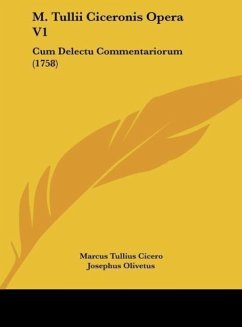
M. Tullii Ciceronis Epistolae Ad Diversos V2 (1830)
Versandkostenfrei!
Versandfertig in 1-2 Wochen
45,99 €
inkl. MwSt.

PAYBACK Punkte
23 °P sammeln!
M. Tullii Ciceronis Epistolae Ad Diversos V2 (1830) est opus quod continet epistolas scriptas a Marco Tullio Cicerone ad diversos homines. Haec epistolarum collectio est secunda pars, quae edita est anno MDCCCXXX, et continet epistolas numeratas a LIII usque ad CXXVII. In his epistolis, Cicero varia themata tractat, inter quae sunt amicitia, philosophia, politica, et iudicia. Haec editio est una ex multis editionibus, quae sunt factae saeculis post mortem Ciceronis, et est una ex fontibus, quibus cognoscere licet vitae et morum antiquorum Romanorum.This scarce antiquarian book is a facsimile r...
M. Tullii Ciceronis Epistolae Ad Diversos V2 (1830) est opus quod continet epistolas scriptas a Marco Tullio Cicerone ad diversos homines. Haec epistolarum collectio est secunda pars, quae edita est anno MDCCCXXX, et continet epistolas numeratas a LIII usque ad CXXVII. In his epistolis, Cicero varia themata tractat, inter quae sunt amicitia, philosophia, politica, et iudicia. Haec editio est una ex multis editionibus, quae sunt factae saeculis post mortem Ciceronis, et est una ex fontibus, quibus cognoscere licet vitae et morum antiquorum Romanorum.This scarce antiquarian book is a facsimile reprint of the old original and may contain some imperfections such as library marks and notations. Because we believe this work is culturally important, we have made it available as part of our commitment for protecting, preserving, and promoting the world's literature in affordable, high quality, modern editions, that are true to their original work.












